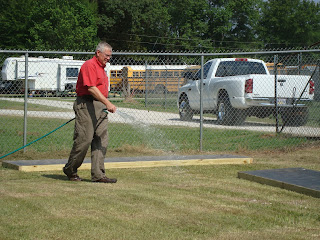(Tim Burress, Mississippi Master Gardener)
My
friend, Carl Wayne Hardeman, has been teaching me about Victory Gardening and
giving away the food without taking a bite for myself for over two years
now. The Collierville Victory Garden has
averaged around 4000 pounds of food a year on 1/10th of an acre and
every bite of it goes to charity.
Stanley
Wise and I have been talking about a project like this at great length for over
a year and we decided that this would be year to make this project begin to happen. We spoke with the Union County Fair Board and
they gave us permission to do this project at the fairgrounds based upon the
facts that the food would be given to the less fortunate.
This
project would also be used as a teaching garden. Originally we were going to
plant corn, but the challenge here was figuring out how to keep the critters
from getting more of the corn than the needy so this required a new plan.
Stanley
had been playing with this new, old idea of “No-Till Mini Gardening.” This plan
seemed more practical and the crop, now tomatoes, squash, and cucumbers would
produce more food in less area and could be contained easier. No-Till Gardening is not new, but is new
again and is ideal for the gardener with limited space and time. We built frames twelve feet long and three
feet wide with a brace in the middle out of pressure treated two by fours. Next we secured landscape fabric on the
bottom of the frames. Next we selected a
space that is relatively flat, has good drainage, and would have at least six
hours of sunshine a day. The grass was
mown down as close as possible and then the area was fertilized. The formula devised by Stanley is as follows: one
cup of triple thirteen, one cup of calcium nitrate, one fourth cup of 0-0-60,
and four cups of pelletized lime. Spread
this mixture, water in liberally, and then place your frame on top of this
area. It is recommended to place stakes
in each corner to keep the frame in place.
Take a knife or a pair of scissors and cut an X in the fabric, then dig
a hole, and place the plants in the hole. We used a small auger in a cordless drill to
dig our holes. In our frames we planted
two rows of six tomatoes and spaced them two feet apart. We added composted leaves to the dirt when we
planted to richen the soil. The squash and cucumbers were planted farther apart
to give them room to run. Peppers were
planted in the corners of the squash and cucumber frames as they don’t require
much room.
The
mini garden frame with the landscape fabric attached will now serve as a mulch
to prevent the need for weeding and will cut down on the chances of fungal
diseases. You can also add decorative
mulch on top if you desire to make the frames more esthetically pleasing to the
eye. The mini garden frame is reusable from year to year and can be moved to a
new location each year if desired. Once
the tomatoes are tall enough we will be staking them with 3/8th
rebar and string in a fashion known as the “Florida Weave.” The rebar stakes will be driven and string
woven in a figure eight pattern to hold the plants off the ground. The stakes since they are metal will also be
reusable from year to year.
This
garden is funded by grants given to the Union County Master Gardeners by The
New Albany News Exchange, Walmart DC, and the Union County Development
Association. The area used for this
garden was provided by the Union County Fair Board and the Board of
Supervisors.
This
garden will also be a part of our teaching gardens and tours are welcome. Stanley Wise has written an in depth
publication (The Amazing No-Till Mini Garden) if you would like further
information. If you would like to tour
our No-till Mini Garden and/or Hoop House, call the Union County Extension
Office at 662-534-1916.
Happy
Gardening and Keep Digging in the Dirt!



